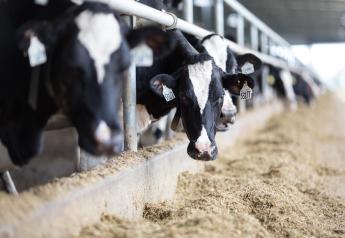Senators to Receive Classified Briefing on Ukraine Wednesday | ‘Paper Agreement’ Update

IMF update Tuesday, FOMC rate hike Wed., GDP report Thursday
Washington Focus
The House and Senate are in session. Key events include another House farm bill listening session, this time at the Bruce Peterson Farm in Northfield, Minnesota. On Thursday, the Senate Finance panel holds a hearing to consider the nomination of Doug McKalip to be Chief Agricultural Negotiator, Office of the United States Trade Representative. The real focus will be elsewhere because on Wednesday the Fed will deliver its latest interest rate hike, plus a presser. On Thursday, the second quarter GDP report is issued. The International Monetary Fund on Tuesday presents updated forecasts. On the Russia/Ukraine war front, the focus is on whether weekend Russian missiles hitting Odesa port will abort the recent “paper agreement” on resuming grain exports from Ukraine.
Senators will receive a classified briefing on Ukraine Wednesday as the Russian invasion hits the five-month mark. Senate Majority Leader Chuck Schumer (D-N.Y.) requested the briefing. Officials from the Defense and State departments, as well as from the Director of National Intelligence’s office, are possible attendees at the briefing.
Russia launched a missile attack on Ukraine’s key grain-exporting port of Odesa hours after signing a deal to ease its blockade and allow for the safe transport of grain necessary. We filed a special report on the development on Saturday. Here are some updates with more likely in Monday’s Policy Updates:
- The Russians launched four “Kalibr” cruise missiles against the port, said a local official. Two of them struck the port, while Ukrainian defenses shot down the two others. Emergency teams could be seen trying to put out a fire inside the port. Russian officials have repeatedly said they don’t target civilian areas. After the Odessa port attack, the Russian Foreign Ministry said it was a precision strike that destroyed military infrastructure. On Sunday, Moscow said Russian missiles had only hit military targets in Odesa and that no grain storage facilities were struck. Russia's foreign ministry claimed only military targets, including western weapon supplies, had been targeted. “Sea-based high-precision long-range missiles destroyed a docked Ukrainian warship and a warehouse with Harpoon anti-ship missiles supplied by the U.S. to the Kyiv regime,” ministry spokesman Igor Konashenkov said at a daily briefing.
- Ukrainian president Volodymyr Zelenskyy claimed Moscow had broken the terms of the deal, the first of its kind between the warring parties, adding it was "the responsibility of the U.N." to ensure the agreement works. "This only proves one thing: whatever Russia says and promises, it will find ways not to implement it," Zelenskyy said Saturday night.
- The route of the “maritime humanitarian corridor” is not yet set; as is the minimum distance from it that military ships, aircraft or drones would be required to maintain.
- Grain storage a problem. With about 60 million tonnes of grain expected from this year’s crop now starting to be harvested, Ukraine lacks storage for about 15 million to 18 million tonnes of grain. If the crops cannot be shipped out soon, much will be left to rot.
- Ukraine could export 60 million tons of grain in eight to nine months if its ports were not blockaded, but Russia's strike on the port of Odessa showed it will definitely not be that easy, an economic adviser to the Ukrainian president said on Sunday, Reuters reported. Ukraine could earn $10 billion by selling 20 million tons of grain in silos and 40 million tons from its new harvest, adviser Oleh Ustenko said. The harvest totals 60 million tons, of which 20 million are for domestic consumption, he said. "If the ports were unblocked now and we say we need to move 60 million tons of grain... then we would transport 60 million tons of grain within eight-nine months," he said. "But with the way they are opening now and what Russia is doing in the Black Sea, yesterday's strike shows that it definitely won't work that way," he said. Ukraine will need 20 to 24 months to export those volumes if its ports are not functioning properly, Ustenko added.
- Even if the agreement holds, there are other hurdles ahead. The Economist notes: “It will probably be one to two months before the first ships—expected to be those trapped in Ukrainian ports since the start of the war—can set sail. Getting new ships into port will take longer given the need to set up the monitoring mechanism, find willing shipowners and crews, and negotiate the necessary insurance cover.”
- A big question mark regarding the “paper agreement” is what’s in it for Russia? Putin’s missiles may already have answered that query. Recall Dmitry Medvedev, the former Russian president and prime minister, this year said food is Russia’s quiet and “menacing” weapon that can protect the country from Western sanctions. The traditional markets for Black Sea grain are North Africa and the Middle East. Ukraine’s wheat harvest went primarily to Indonesia, Egypt, Pakistan, Bangladesh and Morocco. Of note: None of those countries was among the 93 that voted to remove Russia from the U.N. Human Rights Council in an April vote.
- Was initial Russia/Turkey plan to get millions of Ukraine grain to Turkey? Some contacts think so. Turkey is one of the most vulnerable to the supply shortages resulting from the war in Ukraine. Located on the southern side of the Black Sea, Turkey relies on Russia and Ukraine for more than 80% of its wheat imports and is a key trade passage connecting Europe’s breadbasket to Africa and the Middle East. Turkey, which played a key role in bringing the two sides to the negotiating table, said it was "concerned" by the Russian strikes. "The fact that such an incident happened right after the agreement we reached... really concerns us," Turkish Defense Minister Hulusi Akar said.
On the food policy front, the House Education and Labor Committee. The measure would require USDA to modify school nutrition standards every 10 years to keep them in line with federal dietary guidelines. Disagreements could slow the reauthorization of a nutrition law that expired in 2015. One potential issue is a provision that would change the criteria for a school or school district to qualify for community eligibility status that allows free school meals for all enrolled students. Currently, 40% of students in a school or school district must be poor enough to qualify for free lunches and breakfasts. The draft bill would set the threshold at 25% to qualify for community eligibility. The draft legislation would increase reimbursements for meals served in the schools. If approved, the changes would take effect after July 1, 2023. The draft bill also would make changes to the Women, Infants and Children (WIC) supplemental nutrition program by expanding eligibility to children until their sixth birthday or the day they start attending full-day kindergarten, whichever occurs first. The cutoff age now is a child’s fifth birthday or the date they begin full-day kindergarten.
Even if the bill clears the House, it faces a bleak outlook in the Senate. Senate Agriculture Chairman Debbie Stabenow (D-Mich.) and ranking member John Boozman (R-Ark.) have been in talks for a child nutrition reauthorization bill but have not released legislation.
The Senate Committee on Energy and Natural Resources will hold a hearing on Thursday to consider pending legislation. Sen. Joe Manchin (D-W.Va.) will deliver opening remarks and introduce the "Nuclear Waste Administration Act," which aims to establish an independent agency tasked with locating and operating a permanent nuclear waste repository.
The Environmental and Energy Study Institute will host the 25th Annual Congressional Renewable Energy and Energy Efficiency Policy Forum on Monday. The event includes Q&As with lawmakers from the House and Senate Renewable Energy and Energy Efficiency caucuses and discuss several aspects of the Bipartisan Infrastructure Law, including energy modernization, buildings and transportation.
The Commodity Futures Trading Commission (CFTC) will hold an open commission meeting on Wednesday at 9:30 a.m. ET. On the agenda for consideration is a proposed rule on "Governance Requirements for Derivatives Clearing Organizations."
Several CFTC officials are scheduled to make public appearances this week. Chairman Rostin Behnam will join the Brookings Institution's Aaron Klein for a discussion on the future of crypto regulation at 2 p.m. ET on Monday. CFTC Commissioner Christy Goldsmith Romero continues the agency's fireside chat tour, joining the DC Bar on Monday. And Commissioner Caroline D. Pham and former Chairman Christopher Giancarlo will discuss the role of regulation in crypto at the Digital Asset Compliance and Market Integrity Summit on Thursday. Former Consumer Financial Protection Bureau Director Kathy Kraninger and executives from Robinhood Markets Inc., Coinbase Global Inc., FTX and Mastercard Inc. are also on the speaking roster.
Securities and Exchange Commission Chairman Gary Gensler will appear at a Center for Audit Quality conference on Wednesday to discuss the impact of the Sarbanes-Oxley Act as a framework for protecting investors.
Nominations: President Joe Biden’s nominee to be his chief agricultural trade negotiator, Doug McKalip, gets a confirmation hearing via the Senate Finance Committee. McKalip first joined USDA in 1994 and now is a senior adviser to USDA Secretary Tom Vilsack. He previously was a senior policy adviser for rural affairs at the White House Domestic Policy Council during the Obama administration.
The Senate Commerce Committee will consider the nomination of Susie Feliz to the position of assistant secretary of Commerce in a Wednesday hearing. Feliz is currently the National Urban League's vice president for policy and legislative affairs.
On Wednesday, Senate Environment and Public Works Committee holds a markup to vote on the nominations of Joseph Goffman to be assistant EPA administrator for air and radiation; Annie Caputo to be a member of the Nuclear Regulatory Commission; Bradley Crowell to be a member of the Nuclear Regulatory Commission; and 15 GSA resolutions.
On the political speaking front, both Trump and Pence speak in D.C. this week. On Monday, former Vice President Mike Pence is scheduled to address the conservative Heritage Foundation about his "Freedom Agenda" policy initiatives. Pence is thought to be actively exploring a 2024 presidential bid as he seeks to further distance himself from his old boss.
On Tuesday, former President Donald Trump will speak at the America First Policy Institute's two-day summit. It will be his first trip back to the nation's capital since leaving office on January 20, 2021.
Regarding Nov. 8 midterm elections, Dave Wasserman, House editor for the Cook Political Report with Amy Walter, tweeted: “Is the ‘red wave’ ebbing? Probably not much. But as Dems show more signs of life and Rs nominate several problematic candidates, we're downgrading our @CookPolitical House outlook from a GOP gain of 20-35 seats to 15-30 seats.”
Other ag-related hearings and events this week include:
- Monday. Farm bill listening session. House Agriculture Committee session in Northfield, Minn.
- Tuesday. Indo-Pacific policy/operations. Senate Armed Services Committee briefing. Closed.
- Tuesday. Covid-19 vaccines. The White House holds a virtual stream of the “Summit on the Future of Covid-19 Vaccines.”
- Tuesday. Battery minerals. Center for Strategic and International Studies virtual discussion on “The Battery Minerals Supply Challenge.”
- Tuesday. America First meeting. The America First Policy Institute holds its 2022 Summit, featuring several Republican leaders including House Minority Leader Kevin McCarthy (R-Calif.) and former President Donald Trump is to deliver remarks.
- Tuesday. Trade issues. International Trade Administration meeting of the Environmental Technologies Trade Advisory Committee.
- Tuesday. Energy matters. Department of Energy meeting of the Secretary of Energy Advisory Board. Energy Secretary Jennifer Granholm delivers remarks.
- Wednesday. Global food security challenges. House Foreign Affairs Committee hearing.
- Wednesday. Carbon capture utilization technology. Senate Environment and Public Works Committee hearing.
- Wednesday. Ocean Shipping Reform Act. Federal Maritime Commission meeting to discuss a staff briefing on Ocean Shipping Reform Act of 2022.
- Thursday. USDA hemp production program. House Agriculture — Subcommittee on Biotechnology, Horticulture, and Research hearing.
- Thursday: Keeping polluters from getting government contracts. House Natural Resources subcommittee hearing.
- Thursday. FDA Commissioner briefing. Alliance for Health Policy (virtual media briefing with Food and Drug Administration Commissioner Robert Califf.
- Thursday. International food crisis. Society for International Development, Washington, D.C. Chapter virtual discussion on “The Devastating and Enormous Impact of the Food Security Crisis: Looking at an Urgent Need for Solutions from all Sectors.”
- Thursday. Energy legislation. Senate Energy and Natural Resources Committee holds hearing on several energy-related pieces of legislation.
- Thursday. Hunger as weapon resolution, other legislation markup. House Foreign Affairs Committee markup of HRes 922, condemning the use of hunger as a weapon of war and recognizing the effect of conflict on global food security and famine and other legislation
- Thursday. War in Ukraine. Heritage Foundation discussion on “Lessons Learned from the War in Ukraine.”
- Thursday. Fossil fuels. Heritage Foundation discussion on “Examining the Need for Fossil Fuels.”
President Joe Biden's condition has improved, with his only major remaining Covid-19-related symptom being a sore throat, according to his doctor. Biden will keep taking Paxlovid, with Sunday day being the fourth day of the regimen, and the president continues to be treated with Tylenol, oral hydration, low dose aspirin, and an albuterol inhaler, said a letter from his physician Kevin O'Connor on Sunday. "His predominant symptom now is sore throat. This is most likely a result of lymphoid activation as his body clears the virus and is thus encouraging. His rhinorrhea, cough and body aches have diminished considerably. His voice remains a bit deep. His pulse, blood pressure, respiratory rate and temperature all remain normal. His oxygen saturation continues to be excellent on room air. His lungs remain clear," O'Connor wrote.
Economic Reports for the Week
The Federal Open Market Committee meets on Tuesday and Wednesday. The Federal Reserve is expected to raise the target range for the federal funds rate by another 75 points to 2.25% to 2.50%, although futures trading still implies a 20% chance of a 100-point hike. The committee will also hold a press conference on Wednesday. Key financial report comes Thursday with the U.S. gross domestic product figures which may show that the economy posted its second consecutive quarter of contraction —the textbook definition of recession. But it will take longer for the National Bureau of Economic Research (NBER) — the official arbiter — to make a formal declaration.
Tuesday, July 26
- International Monetary Fund presents updated forecasts.
- S&P CoreLogic Case-Shiller National Home Price Index for May is released. Home prices are expected to rise 21.1% year over year, compared with April’s 21.2% gain.
- Conference Board releases its Consumer Confidence Index for July. Economists forecast a 97 reading, a drop from June’s 98.7.
- Census Bureau reports new residential home sales data for June. Consensus estimate is for a seasonally adjusted annual rate of 680,000 new units, versus 696,000 in May.
Wednesday, July 27
- MBA Mortgage Applications
- Federal Open Market Committee announces its monetary-policy decision. The central bank is expected to raise the federal-funds rate by 75 basis points.
- Census Bureau releases the preliminary durable goods report for June. Economists forecast that new orders increased 0.3% month over month from May’s 0.81% rise.
Thursday, July 28
- Jobless Claims
- Bureau of Economic Analysis (BEA) releases its preliminary estimate for second-quarter 2022 gross domestic product. The forecast is for a decline of 1% to 2%, after a 1.6% contraction in the first quarter.
- Fed Balance Sheet
- Money Supply
Friday, July 29
- BEA reports personal income and spending data for June. Personal income is expected to rise 0.5% month over month, while spending is seen rising 1%. This compares with gains of 0.5% and 0.2%, respectively, in May.
- Federal Reserve reports the core personal-consumption expenditures price index for June. Consensus estimate is for the core PCE index to jump 4.8% year over year, compared with 4.7% in May.
Key USDA & international Ag & Energy Reports and Events
Scorching temps throughout the U.S. this week will continue the debate on the weather impacts on crop yields ahead. Meanwhile, as previously noted, focus continues on getting Ukrainian grain shipments resumed, with a Saturday missile attack on the Odesa port placing more questions about an already murky resumption.
Monday, July 25
Ag reports and events:
- Export Inspections
- Crop Progress
- Food Price Outlook
- Poultry Slaughter
- Brazil’s Unica to release cane crushing and sugar output data (tentative)
- Malaysia’s July 1-25 palm oil export data
Tuesday, July 26
Ag reports and events:
- EU weekly grain, oilseed import and export data
- Earnings: ADM
Energy reports and events:
- API weekly U.S. oil inventory report
- EU energy ministers plan to hold an emergency meeting to discuss improving their winter contingency plans and possible energy use rationing, since more than half of the EU’s energy is imported.
Wednesday, July 27
Ag reports and events:
- Broiler Hatchery
- Livestock and Meat Domestic Data
- Citrus: World Markets and Trade
- Egg Products
- Peanut Stocks and Processing
- Earnings: Bunge
Energy reports and events:
- EIA weekly U.S. oil inventory report
- U.S. weekly ethanol inventories
- Genscape weekly crude inventory report for Europe’s ARA region
Thursday, July 28
Ag reports and events:
- Weekly Export Sales
- Buenos Aires grains exchange weekly crop report
- Holiday: Thailand
Energy reports and events:
- EIA natural gas storage change
- Insights Global weekly oil product inventories in Europe’s ARA region
Friday, July 29
Ag reports and events:
- CFTC Commitments of Traders report
- Peanut Prices
- Agricultural Prices
- Farm Production Expenditures
- FranceAgriMer weekly update on crop conditions
- Holiday: Thailand
Energy reports and events:
- Baker Hughes weekly U.S. oil/gas rig counts






